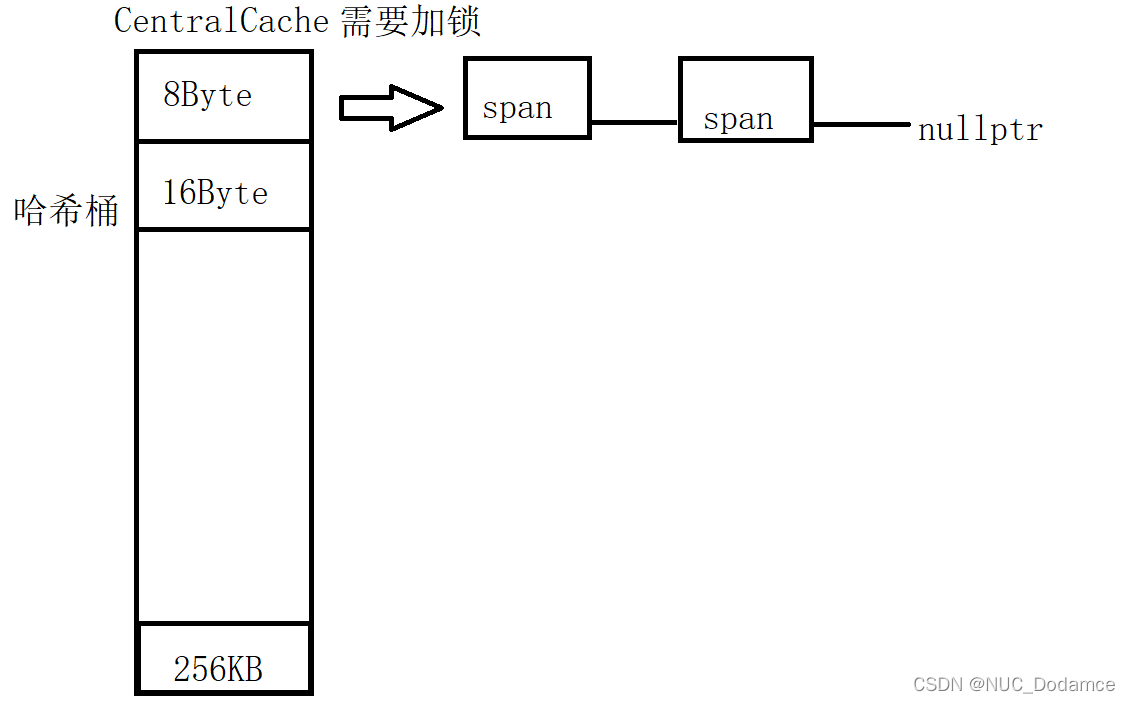文章目录
CentralCache整体设计思路
当线程缓存没有内存时,要中心缓存申请内存。
CentralCache被所有线程共有,需要加锁,为了减少竞争锁资源的力度,选择采用哈希桶锁的方式管理中心缓存层的内存。
eg:如果线程1需要1号桶,线程2需要2号桶。桶的编号不同,锁不同所以不存在竞争。减少的锁的竞争。
哈希中每个桶的大小和ThreadCache规则相同
中心缓存中的以页为单位的大块空间靠span管理。与ThreadCache不同,CentralCache哈希桶保存的不是内存块,而是span链表。

当ThreadCache桶中没有内存向CentralCache要时,先根据要申请的大小(eg:8byte)找到CentralCache中的那个桶,再将8byte桶中的span切分成多个8byte,用链表管理起来。给ThreadCache空间一次给一个span。当8byte桶的第一份span被线程申请完毕后再根据链表找下一个span.

由上可知,随着申请内存大小的不同,span的大小也不同
当CentralCache某个桶内存使用完毕,会再向PageCache申请空间
ThreadCache释放空间
当ThreadCache中桶的内存太大,CentralCache还负责回收内存。
CentralCache的中挂的span中use_count记录分配了多少个对象出去,分配一个对象给Threadache,就++use_count(Span中的成员变量)。
当ThreadCache过长或者线程销毁,则会将内存释放回CentralCache中的,释放回来时use_count。当use_count减到0时则表示所有对象都回到了span,则将span释放回PageCache,PageCache中会对前后相邻的空闲页进行合并。解决内存碎片问题。
CentralCache结构设计
Span设计
设一页的大小是8K
在32位单进程内存最多分成页数为:
2 ^ 32 / 2 ^ 13(8K) =2 ^ 19个页,size_t类型可以存下
在64位单进程内存最多分成页数为:
2 ^ 64 / 2 ^ 13=2 ^ 51 个页,size_t类型存不下,unsigned long long 存
这时为了解决可以使用条件编译解决。
#ifdef _WIN64
typedef unsigned long long PAGE_ID;//64位下的页号
#elif _WIN32
typedef size_t PAGE_ID;
#endif // _WIN32
注意这里不能调换64与32的关系。因为在32位下_WIN32定义,_WIN64没有定义
x64下_WIN32与_WIN64都有定义。所以要把_WIN64放在最前,有_WIN64定义一定是64位。
X64

X86

span要设计成带头双向循环链表,Span与SpanList的基本结构为
//管理以页为单位的大块空间结构
struct Span {
PAGE_ID _PageID;//大块内存页号
size_t _Num;//页数量
Span* _next;//双向链表
Span* _prev;
size_t use_count;//记录分配了多少个对象给ThreadCahce
void* FreeList;//切好的小块内存空间
Span() :_PageID(0), _Num(0), _next(nullptr), _prev(nullptr), use_count(0), FreeList(nullptr) {}
};
class SpanList {
private:
Span* _head;
public:
std::mutex _mtx;//桶锁
SpanList() {//带头双向循环链表
_head = new Span;
_head->_next = _head;
_head->_prev = _head;
}
void Insert(Span* pos, Span* NewSpan) {
//pos位置前插入NewSpan
assert(pos != nullptr && NewSpan != nullptr);
Span* prev = pos->_prev;//前一个
prev->_next = NewSpan;
NewSpan->_prev = prev;
NewSpan->_next = pos;
pos->_prev = NewSpan;
}
void Erase(Span* pos) {
assert(pos != _head);
Span* prev = pos->_prev;
Span* next = pos->_next;
prev->_next = next;
next->_prev = prev;
//还给下一层的PageCache
}
};
中心缓存只有一个,每个线程都可以看见,所以中心缓存类采用单例模式
C++ CentralCache代码
1.公共资源头文件(添加了Span类以及SpanList类,补充了计算中心缓存要给线程缓存多少空间块 ForMemory)
#pragma once
#include<iostream>
#include<vector>
#include<time.h>
#include<assert.h>
#include<thread>
#include<mutex>
#include<algorithm>
using std::cout; using std::endl;
static const size_t MAX_BYTE = 126 * 1024;//如果线程申请超过126KB不能直接向ThreadCache申请空间
static const size_t NUMLIST = 208;//ThreadCache中哈希桶的个数
#ifdef _WIN64
typedef unsigned long long PAGE_ID;//64位下的页号
#elif _WIN32
typedef size_t PAGE_ID;
#endif // _WIN32
//获取自由链表下一个节点
static void*& NextObj(void* obj) {
return *(void**)obj;
}
//管理切分好内存的自由链表
class FreeList {
public:
FreeList() :_freeList(nullptr), MaxSize(1) {}
void Push(void* obj) {
//头插
assert(obj);
NextObj(obj) = _freeList;
_freeList = obj;
}
void* Pop() {
//头删
assert(_freeList);
void* obj = _freeList;
_freeList = NextObj(obj);
return obj;
}
void PushList(void* begin, void* end) {
//头插链表
NextObj(end) = _freeList;
_freeList = begin;
}
bool Empty() { return _freeList == nullptr; }
size_t& GetMaxSize() { return MaxSize; }
private:
void* _freeList;
size_t MaxSize;//记录freeList链表要向中心缓存层申请多少个内存节点
};
//计算ThreadCache中哈希桶的桶个数
class SizeClass {
public:
static inline size_t RoundUp(size_t size) {
if (size <= 128) return _RoundUp(size, 8);
else if (size <= 1024) return _RoundUp(size, 16);
else if (size <= 8 * 1024) return _RoundUp(size, 128);
else if (size < 64 * 1024) return _RoundUp(size, 1024);
else if (size < 256 * 1024) return _RoundUp(size, 8 * 1024);
else{
assert(false);
return -1;
}
}
//计算在哈希桶的那个位置
static inline size_t Index(size_t size) {
assert(size <= MAX_BYTE);
static int Group[4] = { 16,56,56,56 };
if (size <= 128) return _Index(size, 8);
else if (size <= 1024) return _Index(size - 128, 16) + Group[0];
else if (size <= 8 * 1024) return _Index(size - 1024, 128) + Group[1] + Group[0];
else if (size < 64 * 1024) return _Index(size - 8 * 1024, 1024) + Group[2] + Group[1] + Group[0];
else if (size < 256 * 1024) return _Index(size - 64 * 1024, 8 * 1024) + Group[3] + Group[2] + Group[1] + Group[0];
else {
assert(false);
return -1;
}
}
//ThreadCache向中心缓存申请的页的数量
static size_t ForMemory(size_t size) {
assert(size > 0);
size_t num = MAX_BYTE / size;
if (num < 2) {
num = 2;//如果对象很大,一次少给ThreadCache一些。
}
else if (num > 512) {//如果对象很小,一次多给ThreadCache一些
num = 512;
}
return num;
}
private:
static inline size_t _RoundUp(size_t size, size_t AlignNum) {
size_t AligSize = size;
if (size % AlignNum != 0) {
AligSize = (size / AlignNum + 1) * AlignNum;
}
return AligSize;
}
static inline size_t _Index(size_t size, size_t AlignNum) {
size_t Pos = 0;
if (size % AlignNum == 0) {
Pos = size / AlignNum - 1;
}
else {
Pos = size / AlignNum;
}
return Pos;
}
};
//管理以页为单位的大块空间结构
struct Span {
PAGE_ID _PageID;//大块内存页号
size_t _Num;//页数量
Span* _next;//双向链表
Span* _prev;
size_t use_count;//记录分配了多少个对象给ThreadCahce
void* FreeList;//切好的小块内存空间
Span() :_PageID(0), _Num(0), _next(nullptr), _prev(nullptr), use_count(0), FreeList(nullptr) {}
};
class SpanList {
private:
Span* _head;
public:
std::mutex _mtx;//桶锁
SpanList() {//带头双向循环链表
_head = new Span;
_head->_next = _head;
_head->_prev = _head;
}
void Insert(Span* pos, Span* NewSpan) {
//pos位置前插入NewSpan
assert(pos != nullptr && NewSpan != nullptr);
Span* prev = pos->_prev;//前一个
prev->_next = NewSpan;
NewSpan->_prev = prev;
NewSpan->_next = pos;
pos->_prev = NewSpan;
}
void Erase(Span* pos) {
assert(pos != _head);
Span* prev = pos->_prev;
Span* next = pos->_next;
prev->_next = next;
next->_prev = prev;
//还给下一层的PageCache
}
};
2.线程申请空间ConcurrentAlloc.h(每个线程都会有一个独立的ThreadCache对象,实现无锁)
#pragma once
#include"Common.h"
#include"ThreadCache.h"
//线程调用申请ThreadCache空间
static void* ConcurrentAlloc(size_t size) {
//获取线程自己的ThreadCache
if (tls_threadcache == nullptr) {
tls_threadcache = new ThreadCache;
}
cout << std::this_thread::get_id()<<" "<<tls_threadcache<< endl;
return tls_threadcache->ApplySpace(size);
}
static void ConcurrentFree(void* ptr, size_t size) {
//释放时每个线程一定有tls_threadcache
assert(tls_threadcache != nullptr);
tls_threadcache->ReleaseSpace(ptr,size);
}
3.线程缓存层ThreadCache.h(补充了线程缓存层向中心缓存层申请空间的代码)
#pragma once
#include"Common.h"
#include"CentralCache.h"
class ThreadCache {
private:
FreeList _FreeList[NUMLIST];
public:
//申请释放空间
void* ApplySpace(size_t size) {
assert(size <= MAX_BYTE);
size_t AligSize = SizeClass::RoundUp(size);
//计算桶位置
size_t index = SizeClass::Index(AligSize);
if (!_FreeList[index].Empty()) {
return _FreeList[index].Pop();
}
else {
//thread cache没有内存向central cache要空间
return RequestFromCentralCache(index, AligSize);
}
}
void ReleaseSpace(void* ptr, size_t size) {
assert(size <= MAX_BYTE && ptr != nullptr);
size_t index = SizeClass::Index(size);//找到第几个桶
//将这个空间头插到自由链表上
_FreeList[index].Push(ptr);
}
//向中心缓存申请空间
void* RequestFromCentralCache(size_t index, size_t size) {
//慢开始调节算法
size_t Num = std::min(SizeClass::ForMemory(size),_FreeList[index].GetMaxSize());//计算中心层给线程缓存多少个空间节点;
if (Num == _FreeList[index].GetMaxSize()) {
_FreeList[index].GetMaxSize() += 2;//慢增长,每次申请下次会多给ThreadCache空间
}
//依次递增SizeClass::ForMemory(size)是申请上限,一次申请数量不会比它还大
void* begin = nullptr; void* end = nullptr;
size_t actualNum = CentralCache::GetCentralCache()->GiveThreadCache(begin, end, Num, size);
assert(actualNum > 1);//至少会申请到一个空间节点。
if (actualNum == 1) {//实际就获得了一个节点,直接将这个节点返回
return begin;
}
else {
//获得了多个节点,要把这些节点都插入到ThreadCache的哈希桶上
_FreeList[index].PushList(NextObj(begin), end);//将链表的下一个节点插入桶中,头节点返回给ThreadCache
return begin;
}
}
};
//每个线程都会拥有自己的ThreadCache
static __declspec(thread) ThreadCache* tls_threadcache = nullptr;//用static修饰只在当前文件可见
4.中心缓存层核心代码
CentralCache.h
#pragma once
#include"Common.h"
//中心缓存只有一个,每个线程都可以看见,所以中心缓存类采用单例模式(饿汉模式)
class CentralCache {
private:
SpanList _SpanList[NUMLIST];//与ThreadCache桶的大小相同
CentralCache(const CentralCache&) = delete;
static CentralCache _sInst;
public:
CentralCache() {}
static CentralCache* GetCentralCache() {
return &_sInst;
}
//获取一个非空Span,需要向PageCache申请空间,先空开
Span* GetSpan(SpanList& List, size_t size);
size_t GiveThreadCache(void*& start, void*& end, size_t Num, size_t Size);
};
CentralCache.cpp
#include"CentralCache.h"
CentralCache CentralCache::_sInst;//定义了一个对象
size_t CentralCache::GiveThreadCache(void*& start, void*& end, size_t Num, size_t size) {
size_t index = SizeClass::Index(size);
//要求num个内存节点,需要计Span中FreeList空节点个数
_SpanList[index]._mtx.lock();//加锁
Span* span = GetSpan(_SpanList[index], size);
assert(span != nullptr && span->FreeList != nullptr);
start = span->FreeList; end = start;
//变量Num次,找Num个节点
size_t actualNum = 1;//实际获得几个内存节点
for (int i = 0; i < Num - 1; i++) {
if (NextObj(end) == nullptr) break;//如果走到span中FreeList的空,说明span中内存不够Num个,这个时候有多少返回多少
actualNum += 1;
end = NextObj(end);
}
span->FreeList = NextObj(end);
//为分出去的内存节点链表添加nullptr
NextObj(end) = nullptr;
_SpanList[index]._mtx.unlock();
return actualNum;
}
Span* CentralCache::GetSpan(SpanList& List, size_t size) {
//在哈希桶对应位置Span链表中找是否有Span,没有就向PageCache申请空间
return nullptr;
}